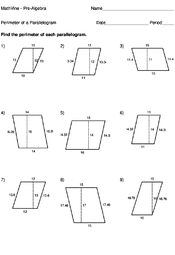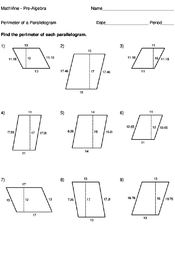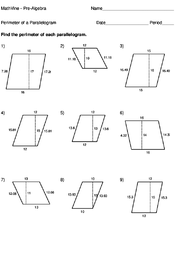Home > Pre-Algebra > Perimeter > Perimeter of a Parallelogram
Perimeter of a Parallelogram
Introduction
A parallelogram is a quadrilateral that has two pairs of parallel sides. A square and a rectangle can also be counted as parallelograms.
The perimeter of a shape is the distance around the outside.
Terms
Area - A quantity that expresses the extent of a two-dimensional shape.
Parallel - Parallel lines are lines that always have the same distance between them.
Parallelogram - A four-sided polygon with opposite sides parallel.
Quadrilateral - A four sided figure.
Lesson
To find the perimeter of a parallelogram, you just need to add up the lengths of all four of the sides. Because a parallelogram has two pairs of sides, you only need to know the length of one of each of the pair.
For example, using the rectangle below you can see that the width is 20cm and the height is 10cm. Therefore, we have two sides of 20cm and two sides of 10cm.
width = 20 cm
height = 10 cm
To find the perimeter, we add those all together:
So, the perimeter of this shape is 60cm.
Examples
Area of a Parallelogram
Perimeter = 2 * Base + 2 * Side
Perimeter = 2 * + 2 *
Area of a Parallelogram (w/ Decimal Base)
Perimeter = 2 * Base + 2 * Side
Perimeter = 2 * + 2 *


